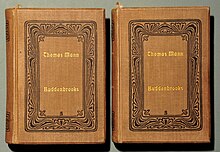Buddenbrooks

First edition (two volumes) covers
|
|
| Author | Thomas Mann |
|---|---|
| Country | Germany |
| Language | German |
| Genre | Family saga |
| Publisher | S. Fischer Verlag, Berlin |
|
Publication date
|
1901 |
| OCLC | 16705387 |
| 833.9/12 | |
Buddenbrooks [ˈbʊdn̩ˌbʁoːks] is a 1901 novel by Thomas Mann, chronicling the decline of a wealthy north German merchant family over the course of four generations, incidentally portraying the manner of life and mores of the Hanseatic bourgeoisie in the years from 1835 to 1877. Mann drew deeply from the history of his own family, the Mann family of Lübeck, and their milieu.
It was Mann's first novel, published in 1901 when he was twenty-six years old. With the publication of the 2nd edition in 1903, Buddenbrooks became a major literary success. The work led to a Nobel Prize in Literature for Mann in 1929; although the Nobel award generally recognises an author's body of work, the Swedish Academy's citation for Mann identified "his great novel Buddenbrooks" as the principal reason for his prize.
Mann began writing the book in October 1897, when he was twenty-two years old. The novel was completed three years later, in July 1900, and published in October 1901. His objective was to write a novel on the conflicts between businessman and artist's worlds, presented as a family saga, continuing in the realist tradition of such 19th-century works as Stendhal's Le Rouge et le Noir (1830; The Red and the Black). More personally, he hoped to surpass the achievement of his eldest brother Heinrich Mann, who had met relative success with his novel In einer Familie (1894, In a Family) and who was working at the time on another novel about German bourgeois society, Im Schlaraffenland (1900, In the Land of Cockaigne). Buddenbrooks is Mann's most enduringly popular novel, especially in Germany, where it has been cherished for its intimate portrait of 19th-century German bourgeois life.
Before Buddenbrooks Mann had written only short stories, which had been collected under the title Der kleine Herr Friedemann (1898, Little Herr Friedemann). They portrayed spiritually challenged figures who struggle to find happiness in (or at the margins of) bourgeois society. Similar themes appear in the Buddenbrooks, but in a fully developed style that already reflects the mastery of narrative, subtle irony of tone, and rich character descriptions of Mann's mature fiction.
...
Wikipedia
